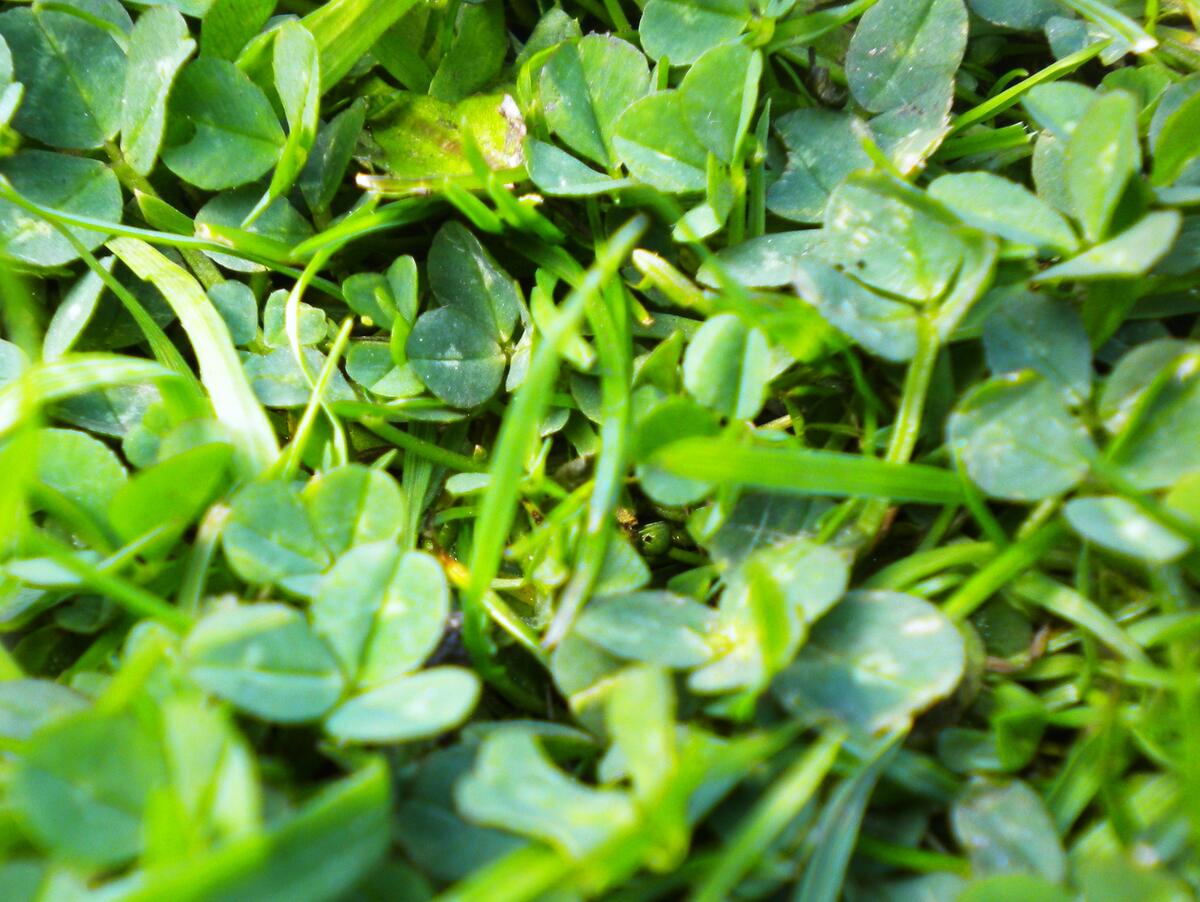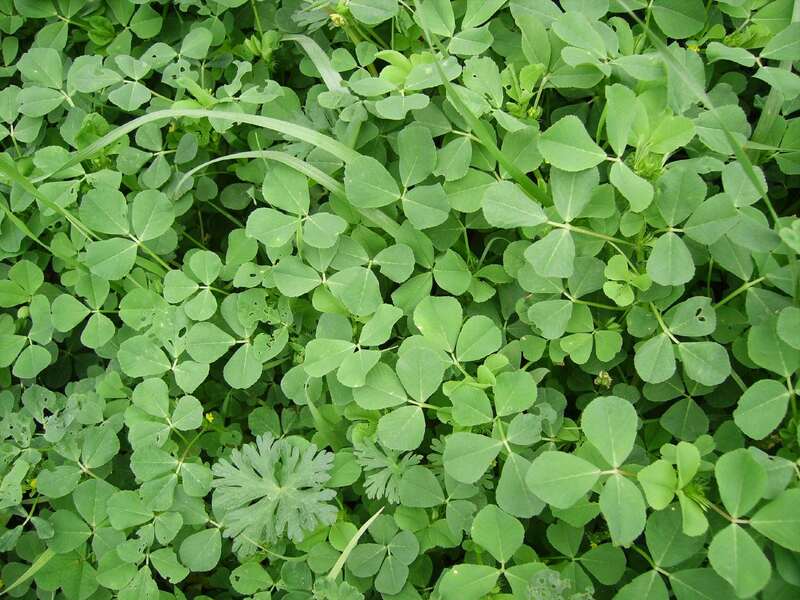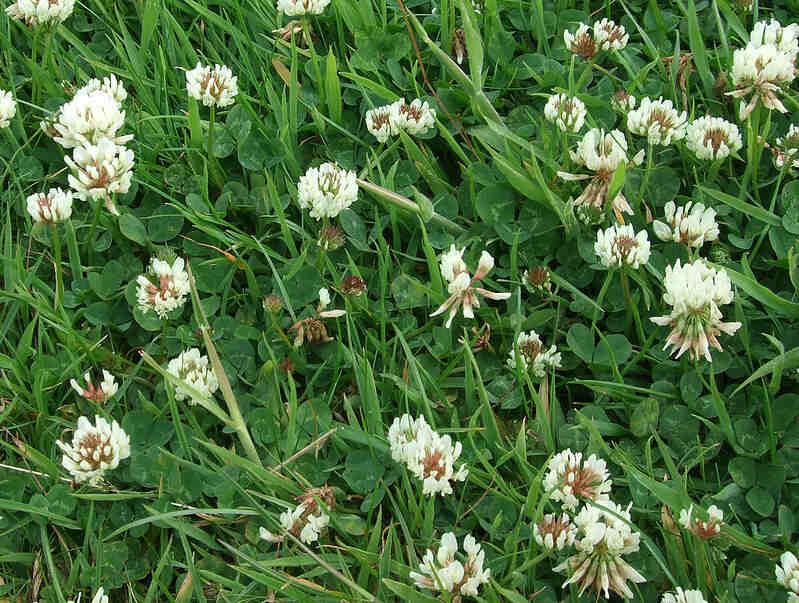
Thinking about changing your traditional turf lawn to clover and want to know the best time to plant clover in Michigan?
It’s best when soil temperatures lie between 50 and 80 degrees Fahrenheit. This is generally in spring, from mid-April to early October. In this article, we’ll guide you on when to plant a clover lawn in Michigan, considering factors like soil warmth and moisture.
Looking for more reasons to go for a clover lawn? Check out our articles:
Planting Clover in Spring

Spring is a great time for planting clover in Michigan due to the mild weather and consistent moisture, which help the seeds germinate and establish themselves. After the fear of frost has passed, you can safely spread clover seed over your prepared soil.
The soil needs to warm up to at least 43 degrees Fahrenheit but not too hot – ideally, somewhere between 50 and 80 degrees Fahrenheit is where clover grows best. In spring, this is typically between mid-April through early May, depending on where you live in the state.
Regional Considerations Across Michigan for Spring Planting
Wait until after the last frost date in your area. According to the Michigan State University Extension, the frost-free dates for different regions in Michigan are as follows:
- For southern and central Michigan, the last frost date is between May 11 and May 31.
- Some areas near the Great Lakes have earlier last frost dates due to the lakes’ moderating effect. For instance, the last frost in Detroit can occur around mid to late April.
- Northern regions and higher elevations tend to have later last frost dates. While most northern cities see the last spring frost dates in May, places like Tahquamenon Falls and Grayling are exceptions, experiencing their final frost even in early June.
*It’s important to note that these dates are not set in stone and can shift from year to year. Be sure to check local weather forecasts and conditions for the most current information.
Spring Planting Pros
- Optimal soil temperature range (50 to 80°F)
- Allows clover to establish before the summer heat
- Favorable growing conditions as temperatures warm and rain is consistent
Spring Planting Cons
- May face competition from weeds
- Requires more watering if spring is dry
- Shorter growing season before winter dormancy
Planting Clover in Late Summer/Early Fall

Late summer and early fall are also good times to sow clover seeds. As the hot Michigan summer starts to cool down into cooler nights, plan to plant clover from mid-August through early October.
*Plant when soil temps are above 50 degrees Fahrenheit but cooling.
This timing allows the clover to establish itself while the soil is still warm from those long sunny days but not too hot anymore. Plus, there’s usually less competition from weeds this time of year since most have completed their life cycle.
Regional Considerations Across Michigan for Fall Planting
Get those seeds in the ground at least six to eight weeks before the first expected frost so they’re well-established. Across the state, fall frost dates can vary:
- In southern Michigan, the first frost typically occurs between Oct. 1 and Oct. 31. Hence, plant your clover by mid-August to early September to ensure it has enough time to grow strong before the cold sets in.
- In central Michigan, you might see frost between Sept. 20 and Oct. 10. For optimal growth before frost, clover seeds should be planted by mid-August.
- Northern Michigan and the Upper Peninsula usually welcome first frosts between Sept. 10 and Sept. 30. So, to allow sufficient time for establishment, clover seeds should be planted by early to mid-August.
Late Summer/Early Fall Planting Pros
- Less weed competition
- Cooler temperatures reduce water stress
- Cover can be established before winter and thrive in spring
Late Summer/Early Fall Planting Cons
- Risk of early frost damage
- It may require irrigation if the fall is dry
- Shorter establishment period before winter
Frost Seeding Clover
Frost seeding is a cool trick people in Michigan can use to their advantage. It involves scattering clover seeds on the ground during the late winter months, typically around March.
*Note: Even if this method defies the warmer soil rules above, it can still be successful. The varying temperatures and moisture levels in late winter and early spring help the seeds get good soil contact and take root as soon as conditions allow.
If you want to give frost seeding a try, do it when the snow has mostly melted and nighttime temperatures are still causing some light freezes.
Frost Seeding Pros
- Takes advantage of natural freeze-thaw cycles
- Minimal soil disturbance
- Early start for spring growth
Frost Seeding Cons
- Unpredictable winter conditions
- Requires careful timing to avoid late winter storms
FAQ About Planting Clover in Michigan
Does the type of clover affect when you should plant it?
While the general advice for planting clover is a good starting point, always check the packet or consult with a local nursery for the specific variety of clover you’re planting. Some types have been bred for certain climates or conditions, so the ideal planting times might differ slightly from general guidelines.
How long does clover take to germinate?
Clover typically takes 7 to 15 days to germinate, provided the conditions are right. It likes moist soil and mild temperatures.
Does clover have to be replanted every year?
The most popular types of clover, like white and red clover, are perennials. This means they don’t need to be replanted every year; instead, they come back on their own after dormancy.
Properly managed clover stands can thrive for several years before you might consider reseeding.
Hire a Local Landscaping Pro
Planting clover in Michigan takes the perfect timing and weather conditions. If you’re still not sure where to start, hire a local Michigan pro.
LawnStarter connects you with the best local landscaping pros who can advise you on the perfect timing and approach for planting clover in Michigan. Whether you’re in Ann Arbor, Detroit, Brighton, Grand Rapids– or anywhere else in the great state of Michigan – LawnStarter can connect you with passionate lawn care and landscaping pros with helpful advice.
Main Image Credit: steve p2008 / Flickr / CC BY 2.0





